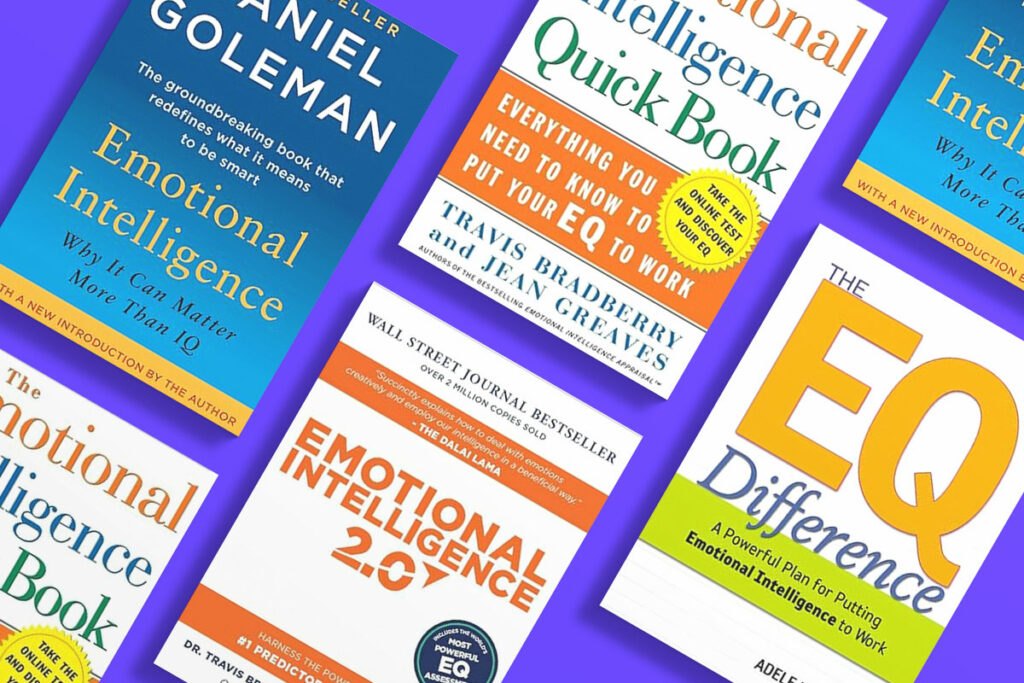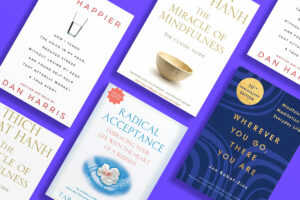
Emotional Intelligence (EI), also known as Emotional Quotient (EQ), is the ability to understand, manage, and use emotions effectively. It is a critical skill for personal and professional success, influencing how we interact with others, handle stress, and make decisions. Improving your emotional intelligence can lead to better relationships, enhanced communication skills, and greater overall well-being. This article explores some of the best books that can help you enhance your emotional intelligence.
What is Emotional Intelligence?
Before diving into the book recommendations, it’s important to understand what emotional intelligence entails. According to Daniel Goleman, who popularized the concept, EI comprises five key components:
- Self-Awareness: Recognizing and understanding your own emotions.
- Self-Regulation: Managing your emotions in healthy ways.
- Motivation: Harnessing emotions to pursue goals with energy and persistence.
- Empathy: Understanding the emotions of others.
- Social Skills: Managing relationships to move people in desired directions.
Why Improve Your Emotional Intelligence?
Improving your emotional intelligence can lead to numerous benefits, including:
- Better Relationships: Enhanced ability to connect with others and resolve conflicts.
- Improved Communication: Clearer expression of thoughts and understanding of others’ perspectives.
- Increased Resilience: Better stress management and emotional regulation.
- Greater Leadership Skills: Ability to inspire and manage teams effectively.
- Enhanced Well-Being: Overall improvement in mental health and life satisfaction.
Top Books to Improve Your Emotional Intelligence
Here are some highly recommended books that can help you develop and enhance your emotional intelligence:
1. Emotional Intelligence: Why It Can Matter More Than IQ by Daniel Goleman
Overview: This groundbreaking book by Daniel Goleman introduces the concept of emotional intelligence and explains why it is a more significant predictor of success than IQ. Goleman explores the five components of EI and provides practical advice on how to develop these skills.
Key Takeaways:
- Understanding the importance of EI in personal and professional success.
- Strategies for improving self-awareness, self-regulation, and empathy.
- Insights into how EI can enhance leadership and relationship-building.
2. The Emotional Intelligence Quick Book: Everything You Need to Know to Put Your EQ to Work by Travis Bradberry and Jean Greaves
Overview: This practical guide offers a straightforward approach to understanding and improving emotional intelligence. Bradberry and Greaves provide tools and techniques for assessing and enhancing your EI, with a focus on actionable steps.
Key Takeaways:
- Techniques for increasing self-awareness and managing emotions.
- Tips for improving social skills and relationship management.
- Strategies for using EI to achieve personal and professional goals.
3. Emotional Intelligence 2.0 by Travis Bradberry and Jean Greaves
Overview: Building on the success of their first book, Bradberry and Greaves provide a step-by-step program for increasing your emotional intelligence. This book includes an online assessment to help you identify your strengths and areas for improvement.
Key Takeaways:
- Personalized strategies for developing each component of EI.
- Practical tips for applying EI in various aspects of life.
- Access to an online assessment for a tailored EI improvement plan.
4. The EQ Difference: A Powerful Plan for Putting Emotional Intelligence to Work by Adele B. Lynn
Overview: Adele Lynn’s book focuses on how to leverage emotional intelligence in the workplace. She provides a comprehensive plan for enhancing EI to improve leadership, teamwork, and communication.
Key Takeaways:
- Understanding the role of EI in professional settings.
- Techniques for developing emotional competencies in the workplace.
- Strategies for using EI to lead and inspire teams.
5. Primal Leadership: Realizing the Power of Emotional Intelligence by Daniel Goleman, Richard Boyatzis, and Annie McKee
Overview: This book explores the connection between emotional intelligence and effective leadership. The authors argue that the most successful leaders are those who possess high levels of EI and can connect with their teams on an emotional level.
Key Takeaways:
- The impact of EI on leadership effectiveness.
- Techniques for developing emotional competencies as a leader.
- Case studies illustrating the power of emotionally intelligent leadership.
6. The Art of Empathy: A Complete Guide to Life’s Most Essential Skill by Karla McLaren
Overview: Empathy is a crucial component of emotional intelligence, and Karla McLaren’s book provides a deep dive into developing this skill. McLaren offers practical exercises and insights to help readers cultivate empathy in their daily lives.
Key Takeaways:
- Understanding the importance of empathy in relationships.
- Techniques for enhancing empathetic abilities.
- Practical exercises for developing greater emotional awareness and connection.
7. Working with Emotional Intelligence by Daniel Goleman
Overview: In this follow-up to his original book, Daniel Goleman focuses on the role of emotional intelligence in the workplace. He provides insights and strategies for using EI to achieve professional success.
Key Takeaways:
- The impact of EI on job performance and career advancement.
- Techniques for improving emotional competencies in professional settings.
- Strategies for building emotionally intelligent teams and organizations.
8. Rising Strong: How the Ability to Reset Transforms the Way We Live, Love, Parent, and Lead by Brené Brown
Overview: Brené Brown’s book focuses on resilience and the power of vulnerability. She explores how acknowledging and learning from our emotions can lead to greater strength and emotional intelligence.
Key Takeaways:
- The importance of vulnerability in personal growth and emotional intelligence.
- Techniques for developing resilience and emotional strength.
- Strategies for using emotional intelligence to lead a fulfilling life.
9. The Emotionally Intelligent Leader by Daniel Goleman
Overview: This collection of Goleman’s writings focuses specifically on leadership and emotional intelligence. It provides insights into how leaders can develop and apply EI to inspire and motivate their teams.
Key Takeaways:
- Understanding the role of EI in effective leadership.
- Techniques for developing emotional competencies as a leader.
- Strategies for fostering a positive and emotionally intelligent workplace culture.
10. Crucial Conversations: Tools for Talking When Stakes Are High by Kerry Patterson, Joseph Grenny, Ron McMillan, and Al Switzler
Overview: This book provides tools and techniques for navigating difficult conversations with emotional intelligence. The authors offer practical advice for handling high-stakes discussions with empathy and effectiveness.
Key Takeaways:
- Techniques for staying calm and focused during crucial conversations.
- Strategies for fostering open and productive dialogue.
- Tips for using emotional intelligence to resolve conflicts and build stronger relationships.
Integrating Emotional Intelligence into Your Life
Reading these books is a great first step towards improving your emotional intelligence, but the key to lasting change is practice. Here are some practical ways to integrate EI into your daily life:
1. Practice Self-Awareness
- Mindfulness Meditation: Spend a few minutes each day practicing mindfulness meditation to become more aware of your thoughts and emotions.
- Journaling: Keep a journal to reflect on your daily experiences and emotions. This can help you identify patterns and triggers.
2. Develop Self-Regulation
- Breathing Exercises: Practice deep breathing exercises to manage stress and regulate your emotions.
- Pause and Reflect: Before reacting to a situation, take a moment to pause and consider your response.
3. Enhance Motivation
- Set Goals: Set clear, achievable goals that align with your values and passions.
- Positive Affirmations: Use positive affirmations to boost your confidence and motivation.
4. Cultivate Empathy
- Active Listening: Practice active listening by giving your full attention to others and responding with empathy.
- Perspective-Taking: Try to see situations from others’ perspectives to better understand their feelings and experiences.
5. Improve Social Skills
- Effective Communication: Focus on clear and effective communication, both verbally and non-verbally.
- Build Relationships: Invest time in building and nurturing relationships with others, both personally and professionally.
Leveraging Audio Book Summaries for Emotional Intelligence
To further enhance your learning, consider leveraging audio book summaries. BookBits offers concise summaries of many of the books mentioned in this article, providing you with key insights and practical tips in a convenient format. Listening to these summaries can help you reinforce your understanding of emotional intelligence concepts and integrate them into your daily life.
Recommended Audio Book Summaries
- Emotional Intelligence: Why It Can Matter More Than IQ by Daniel Goleman: A summary that highlights the core components of EI and practical strategies for improvement.
- Emotional Intelligence 2.0 by Travis Bradberry and Jean Greaves: Key takeaways from the book, including personalized strategies for developing EI.
- The Art of Empathy by Karla McLaren: Insights into cultivating empathy and enhancing emotional awareness.
- Crucial Conversations by Kerry Patterson et al.: Techniques for navigating difficult conversations with emotional intelligence.
Conclusion
Improving your emotional intelligence is a valuable investment in your personal and professional growth. By reading and applying the insights from these recommended books, you can enhance your self-awareness, self-regulation, motivation, empathy, and social skills. Whether you are looking to improve your relationships, advance in your career, or simply lead a more fulfilling life, developing your emotional intelligence is key.
For more insights and tips on emotional intelligence, subscribe to BookBits and explore our extensive library of audio book summaries. By leveraging these resources, you can stay informed and inspired on your journey to becoming more emotionally intelligent.


